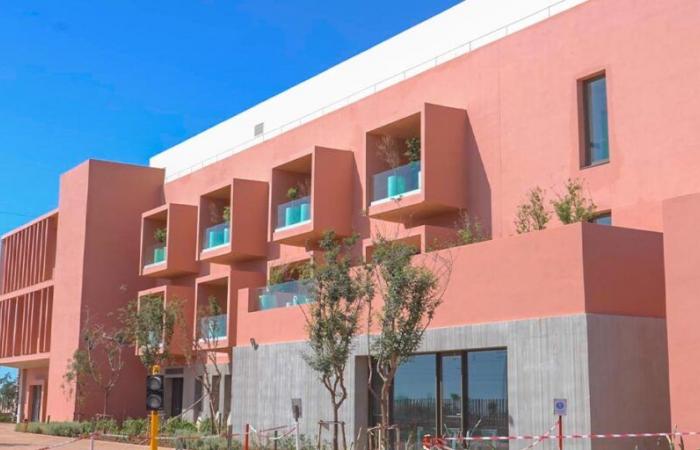Mohammed VI Polytechnic University (UM6P) is redefining the contours of medical innovation in Africa with the Smart Health Care City (SHCC). This project combines training, cutting-edge medical infrastructure and technological development to respond to local and continental health challenges.
Mohammed VI Polytechnic University (UM6P), spearhead of innovation in Africa, is pushing the boundaries of research and training in the field of health. Thanks to an innovative ecosystem, the establishment implements an integrated strategy combining education, technological innovation and medical services. At the heart of this dynamic, the Smart Health Care City (SHCC) embodies a flagship project, designed to transform the landscape of health systems through an ambitious and sustainable vision.
A holistic project serving health
The Smart Health Care City (SHCC) goes beyond the scope of a care or learning center. This project is based on a strategy structured around three fundamental axes, each contributing to building an integrated and visionary model for the health sector. The first axis, focused on training, highlights the central role of the Faculty of Medical Sciences (FMS).
The latter offers diversified programs in medicine, pharmacy and nursing. The teaching approach adopted favors practical learning and active research, allowing students to develop solid technical skills while cultivating critical thinking. From their earliest years, students participate in cutting-edge research projects, strengthening their clinical expertise in a stimulating and innovative academic environment.
Furthermore, the SHCC is distinguished by cutting-edge medical infrastructures, grouped within the University Hospital Center (CHU). This complex includes a general hospital, a geriatrics center and a functional rehabilitation center. Equipped with state-of-the-art equipment such as a 3T MRI and hyperbaric devices, the University Hospital is designed to treat complex pathologies while ensuring equitable access to care, particularly for local populations in the Rhamna region.
This component illustrates the SHCC’s commitment to combining medical excellence and social impact. The third pillar, dedicated to innovation, is taking shape in the Biotechnology Park, a real lever of transformation for health. This dynamic space acts as an incubator, promoting collaboration between startups, researchers and healthcare professionals.
Thanks to high-level technical and scientific support, the Park stimulates the development of innovative solutions in biotechnology and connected medicine, thus consolidating the SHCC’s place as a technological hub serving health.
Research as a driver of progress
The UM6P places research at the center of its priorities. With cutting-edge infrastructure, such as a unique medical simulation center, the institution allows students to train on complex clinical cases. Research projects cover crucial themes such as epidemiology, neurobiology, artificial intelligence applied to medicine and microbiology.
In partnership with prestigious institutions such as Harvard Medical School and Karolinska University, UM6P offers its doctoral students unparalleled opportunities to join international teams. These collaborations facilitate the exchange of know-how and the development of solutions adapted to the specific needs of the African continent.
Total immersion training
The UM6P FMS stands out for its immersive educational approach, based on the concept of learning by doing. Students benefit from personalized supervision, participate in practical workshops and collaborate on innovative research projects upon their integration. Modern infrastructures, including simulation laboratories, make it possible to recreate realistic clinical environments.
Additionally, dual degree programs, such as the MD/PhD or PharmaD/PhD, enhance the university’s international appeal. These courses meet a requirement for excellence, training professionals capable of intervening effectively in a globalized context.
Regional and international impact
In addition, the UM6P University Hospital plays a central role not only in Morocco, but also in the Rhamna region. By guaranteeing equitable access to care and offering quality services, it contributes to reducing geographic disparities in the medical field.
Furthermore, partnerships with foreign institutions allow the university to be part of a global approach, while maintaining local roots.
The use of advanced technologies, such as artificial intelligence for diagnosis or medical data management, positions UM6P as a key player in the development of connected medicine in Africa. This approach, combined with a strong focus on sustainability, makes it an inspiring model for other regions around the world.
Transforming health in Africa
The ultimate goal of UM6P is to become a global reference in innovative health systems. With an ecosystem that combines education, research and medical services, the institution aspires to meet the continent’s health challenges.
The Smart Health Care City, with its integrated approach and technological solutions, constitutes a concrete example of this vision. By placing people at the center of its concerns, the UM6P contributes to the improvement of care, but also to the training of a new generation of professionals ready to respond to the challenges of the 21st century.
Sanae Raqui / ECO Inspirations






